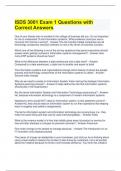UNFAIR DISMISSAL
OVERVIEW
Ø Unfair dismissal is a statutory claim for compensation
Ø Concerns the reason for the dismissal being unfair
Ø Typically only accrues after 2 years of employment
Ø Can involve actual or constructive dismissal
Ø Successful claimants can recover a basic and potentially compensatory award
TIME LIMITS
Unfair dismissal claims must be bought within 3 months (less 1 day) of the date of
dismissal (i.e. count back a day from the date of dismissal to make sure the claim is
within time)
Prior to issuing ET proceedings, would have to refer the matter to early conciliation at
ACAS and would have to get a certificate of that reference from ACAS in order to lodge
that claim with the ET
, STEP 1: ELIGIBILITY (BURDEN OF PROOF ON EMPLOYEE)
Must be bought within 3 months (less 1 day) of the date of dismissal
Every eligible employee has the right not to be unfairly dismissed by his employer (ERA 1996,
s 94)
Only available to employees who have been dismissed. Individual MUST be an employee (not
a worker) and have the necessary 2 years’ continuous employment (ERA 1996, s 108)
Employee must NOT be part of an excluded class
STEP 2: DISMISSAL (BURDEN OF PROOF ON EMPLOYEE)
In order to pursue a complaint of unfair dismissal, a person must:
1. be an employee; (ss 94, 135 ERA 1996)
An employee is defined as ‘an individual who ... works under ... a contract of
employment’ (ERA 1996, s 230(1))
Self- employed, workers and independent contractors are EXCLUDED from
entitlement
2. have been dismissed;
s95(1)(a) – (c) ERA 1996, dismissal may arise in 1 of 3 ways:
a) the contract is terminated by the employer (whether with or without
notice) – ACTUAL DISMISSAL; or
An employee is treated as dismissed if ‘the contract under which he is
employed ... is terminated by the employer (whether with or without notice)’
(ERA 1996, ss 95(1)(a) and 136(1)(a))
This is an objective test: Futty v Brekkes (D&D)
b) a limited term expires without being renewed or is ended early; or
The non-renewal of a limited-term contract is treated as a dismissal for the
purpose of pursuing the statutory claims
Limited term expires without being renewed: dismissal – ERA 1996,
s95(1)(b) and 136(1)(b)
Limited term terminated before the term expires: dismissal – s96(1)(a) or
s136(1)(a)
OVERVIEW
Ø Unfair dismissal is a statutory claim for compensation
Ø Concerns the reason for the dismissal being unfair
Ø Typically only accrues after 2 years of employment
Ø Can involve actual or constructive dismissal
Ø Successful claimants can recover a basic and potentially compensatory award
TIME LIMITS
Unfair dismissal claims must be bought within 3 months (less 1 day) of the date of
dismissal (i.e. count back a day from the date of dismissal to make sure the claim is
within time)
Prior to issuing ET proceedings, would have to refer the matter to early conciliation at
ACAS and would have to get a certificate of that reference from ACAS in order to lodge
that claim with the ET
, STEP 1: ELIGIBILITY (BURDEN OF PROOF ON EMPLOYEE)
Must be bought within 3 months (less 1 day) of the date of dismissal
Every eligible employee has the right not to be unfairly dismissed by his employer (ERA 1996,
s 94)
Only available to employees who have been dismissed. Individual MUST be an employee (not
a worker) and have the necessary 2 years’ continuous employment (ERA 1996, s 108)
Employee must NOT be part of an excluded class
STEP 2: DISMISSAL (BURDEN OF PROOF ON EMPLOYEE)
In order to pursue a complaint of unfair dismissal, a person must:
1. be an employee; (ss 94, 135 ERA 1996)
An employee is defined as ‘an individual who ... works under ... a contract of
employment’ (ERA 1996, s 230(1))
Self- employed, workers and independent contractors are EXCLUDED from
entitlement
2. have been dismissed;
s95(1)(a) – (c) ERA 1996, dismissal may arise in 1 of 3 ways:
a) the contract is terminated by the employer (whether with or without
notice) – ACTUAL DISMISSAL; or
An employee is treated as dismissed if ‘the contract under which he is
employed ... is terminated by the employer (whether with or without notice)’
(ERA 1996, ss 95(1)(a) and 136(1)(a))
This is an objective test: Futty v Brekkes (D&D)
b) a limited term expires without being renewed or is ended early; or
The non-renewal of a limited-term contract is treated as a dismissal for the
purpose of pursuing the statutory claims
Limited term expires without being renewed: dismissal – ERA 1996,
s95(1)(b) and 136(1)(b)
Limited term terminated before the term expires: dismissal – s96(1)(a) or
s136(1)(a)



